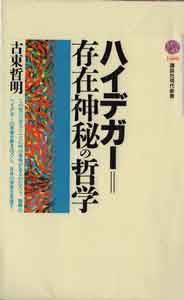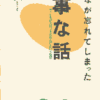
この本の第一印象は「字が小さい」(勘違いでした!)。読みはじめの印象は、「オトナが高校生に話しているみたい」。「〜憶えておいてほしい」「わかっていただいたと思う」、難しくてわからないって。
この本の前に岩波新書の「ミシェル・フーコー」を読んだのですが、その本はフーコーに忠実で著者の考えは殆ど見えませんでした。本書はハイデガーというより著者の考えが全面に出ているような気がしました。本人が書いているように「本書はハイデガーの解説書では」ありません。しかし、誰も自分の考えを入れることなしに他人の思考を語ることはできません。ですから、ハイデガーを通じて著者の考えを述べてもいいわけです。「ハイデガーそのもの」を知りたいのならハイデガーの著作を読むしかありません(翻訳書は、訳者の考えが入っていますが)。
読みすすめると、西田幾多郎と似ているなあという思いがどんどん膨らんできました。ハイデガーは西田より19歳年下です。両者がどのような関係だったのかは知りません(太田裕信「西田幾多郎とハイデガー『存在と時間』」、「西田幾多郎とハイデガー」でググると、これが最初に出てきました。面白そうです。)。どちらもピュシスに対するロゴスの優先を批判しているように思います。西田の弟子たちが『近代の超克』を、ハイデガーがナチスに協力したのも似ている気がします。
わからない、つまらないで読み進めていましたが、衝撃を受けたのは最終章です。子供時代の感覚が描かれています。当たり前の感覚ですが、ハイデガーのエルアイクニスや西田の悟りに近い感覚だと思います。個体発生は系統発生を再現するんですね。「ある」ことの自然な感覚。それが失われた(生まれた時からテレビが有る)子どもたちが今、おとなになっているんですよね。これだけで、この本は「名作」だと思ってしまいました。
『〈子供〉の誕生』を読む前に、子供の定義をしてみます。子供とは「非識字の人間」です。つまり非論理的な(ロゴスで捉えられない)人です。それは克服すべき状態とされます。と同時に女性や未開人(口承文化人)に対する侮蔑・支配のもととなります。「ちゃんと説明しろよ」「だって、説明できないことだってあるでしょ」、というわけです(どういうわけ?)。
ところが、女性の社会進出とテレビゲームで育った子どもには非識字の時代がありません。私はテレビのなかった子供時代を送った最後の世代として(弟は子供の時からテレビが有ったと思う)、その感覚を伝える責任があると思っています。でも、子供の頃の記憶はないし(;_;)、それを文字で伝えることは難しい。そんなとき、ハイデガーや西田の思索は参考になると思っています。
ハイデガーのナチス支持に関する意味が説明されます。それは「支持」そのものの事実を認めた上で、その原因をハイデガーの思想そのものに求めています。その根本を「ニヒリズム」という言葉で説明しています。それは現代(近代)批判です。「ニヒリズム」という言葉に負の意味だけを押し付ける現代社会ですが、それをしっかりキーワードとして考えることは重要です。そして、思考と社会変革の関係も明確になってきます(私は、今ひとつ理解できない、どこか納得できない部分はありますが)。
ハイデガーと西田の「歴史」感覚はどうも時間的・空間的な歴史概念が抜けていると思います。(生物の)存在が時間を作り出しているというのはわからないでもない。でも、歴史は文字が作り出します。文字のない文化に私たちがいうような歴史がない、書かれていない歴史はないことでもそれは明らかです。「いまここ」は識字文化と口承文化の差異を理解するために必須です。でも、「唯一一回性」の「過去と未来の絶対的自己矛盾のとしての現在」は「歴史そのもの」でも「歴史の否定」でもありません。歴史とは文字である、という認識の上に「西洋形而上学批判」や「科学的思考批判」等が組み立てられなければならないと思います。
今、この本を読み直すだけの気力はありません。しかし、いつかまた本書に戻ってくるだろうと思います。
⟨impressions⟩
The first impression of this book was "small letters" (I was mistaken!). The impression at the beginning of reading is, "It looks like an adult is talking to a high school student." "I want you to remember" "I think you understand", it's difficult and I don't understand.
I read Iwanami's new book "Michel Foucault" before this book, but the book was faithful to Foucault and I could hardly see the author's thoughts. I felt that this book was more about the author's ideas than Heidegger. As he wrote, "this book is not Heidegger's manual". However, no one can tell the thoughts of others without putting in their own thoughts. Therefore, it is okay to express the author's thoughts through Heidegger. If you want to know "Heidegger itself", you have to read Heidegger's book (although the translation contains the thoughts of the translator).
As I read it, I began to feel that it was similar to Kitaro Nishida. Heidegger is 19 years younger than Nishida. I don't know what the relationship was between the two (Hironobu Ota "Kitaro Nishida and Heidegger" Being and Time "" and "Kitaro Nishida and Heidegger", and this came out first. It seems interesting. ). Both seem to criticize Logos' priority over Physis. I think it's similar to Nishida's disciples cooperating with the Nazis in "Modern Transcendence."
I didn't understand, I was reading it boringly, but it was the final chapter that shocked me. It depicts the feeling of childhood. It's a natural feeling, but I think it's close to Heidegger's El Aiknis and Nishida's enlightenment. Ontogeny reproduces phylogeny. A natural sense of "being". Children who lost it (there is a TV from the time they were born) are now adults. This alone made me think that this book was a "masterpiece".
Before reading "The Birth of a", let's define a child. A child is an "illiterate person." In other words, it is an illogical person (not captured by Logos). It is a condition to overcome. At the same time, it becomes a source of contempt and control over women and barbarians (oral culture people). "Please explain it properly." "Because there are things you can't explain, right?" (Why?).
However, there is no era of illiteracy for children raised by women's social advancement and video games. As the last generation of my childhood without TV (I think my brother had TV since he was a kid), I think he has a responsibility to convey that feeling. However, I don't remember when I was a kid (; _;), and it's difficult to convey it in letters. In such a case, I think Heidegger and Nishida's thoughts will be helpful.
The implications of Heidegger's support for the Nazis are explained. It acknowledges the fact of "support" itself and seeks the cause from Heidegger's thought itself. The root is explained by the word "nihilism". It is a modern criticism. It is a modern society that imposes only a negative meaning on the word "nihilism", but it is important to think of it firmly as a keyword. And the relationship between thinking and social change becomes clear (although I don't understand it, there are some things I don't understand).
I think Heidegger and Nishida's sense of "history" lacks the concept of temporal and spatial history. It is not unclear that the existence of (living organisms) creates time. But history is created by letters. It is also clear that there is no history, as we say, in a culture without letters, no unwritten history. "Imakoko" is essential for understanding the difference between literacy culture and oral culture. However, the "uniqueness" of "the present as an absolute self-contradiction between the past and the future" is neither "history itself" nor "denial of history". I think that "criticism of Western metaphysics" and "criticism of scientific thinking" must be constructed based on the recognition that history is a letter.
I don't have the energy to reread this book right now. However, I think I will come back to this book someday.
The first impression of this book was "small letters" (I was mistaken!). The impression at the beginning of reading is, "It looks like an adult is talking to a high school student." "I want you to remember" "I think you understand", it's difficult and I don't understand.
I read Iwanami's new book "Michel Foucault" before this book, but the book was faithful to Foucault and I could hardly see the author's thoughts. I felt that this book was more about the author's ideas than Heidegger. As he wrote, "this book is not Heidegger's manual". However, no one can tell the thoughts of others without putting in their own thoughts. Therefore, it is okay to express the author's thoughts through Heidegger. If you want to know "Heidegger itself", you have to read Heidegger's book (although the translation contains the thoughts of the translator).
As I read it, I began to feel that it was similar to Kitaro Nishida. Heidegger is 19 years younger than Nishida. I don't know what the relationship was between the two (Hironobu Ota "Kitaro Nishida and Heidegger" Being and Time "" and "Kitaro Nishida and Heidegger", and this came out first. It seems interesting. ). Both seem to criticize Logos' priority over Physis. I think it's similar to Nishida's disciples cooperating with the Nazis in "Modern Transcendence."
I didn't understand, I was reading it boringly, but it was the final chapter that shocked me. It depicts the feeling of childhood. It's a natural feeling, but I think it's close to Heidegger's El Aiknis and Nishida's enlightenment. Ontogeny reproduces phylogeny. A natural sense of "being". Children who lost it (there is a TV from the time they were born) are now adults. This alone made me think that this book was a "masterpiece".
Before reading "The Birth of a
However, there is no era of illiteracy for children raised by women's social advancement and video games. As the last generation of my childhood without TV (I think my brother had TV since he was a kid), I think he has a responsibility to convey that feeling. However, I don't remember when I was a kid (; _;), and it's difficult to convey it in letters. In such a case, I think Heidegger and Nishida's thoughts will be helpful.
The implications of Heidegger's support for the Nazis are explained. It acknowledges the fact of "support" itself and seeks the cause from Heidegger's thought itself. The root is explained by the word "nihilism". It is a modern criticism. It is a modern society that imposes only a negative meaning on the word "nihilism", but it is important to think of it firmly as a keyword. And the relationship between thinking and social change becomes clear (although I don't understand it, there are some things I don't understand).
I think Heidegger and Nishida's sense of "history" lacks the concept of temporal and spatial history. It is not unclear that the existence of (living organisms) creates time. But history is created by letters. It is also clear that there is no history, as we say, in a culture without letters, no unwritten history. "Imakoko" is essential for understanding the difference between literacy culture and oral culture. However, the "uniqueness" of "the present as an absolute self-contradiction between the past and the future" is neither "history itself" nor "denial of history". I think that "criticism of Western metaphysics" and "criticism of scientific thinking" must be constructed based on the recognition that history is a letter.
I don't have the energy to reread this book right now. However, I think I will come back to this book someday.
[出演者(プロフィール)]
古東哲明(ことうてつあき)
1950年生まれ。京都大学大学院博士課程修了。現在、広島大学総合科学部教授。専攻は、哲学・比較思想。著書に、『〈在る〉ことの不思議』――勁草書房――、『現代思想としてのギリシア哲学』――講談社選書メチエ――、編著に、『ニヒリズムからの出発』――ナカニシヤ出版――などがある。
この世に〈在る〉ことに何の意味があるのだろう。
難解なハイデガーの思索を解きほぐし、存在の深奥を見通す!
この世と出会い直すために――
この本を書くにあたり、なにより導きの糸になったのはハイデガーである。だが、それにしてもなぜことさら、ハイデガーなのか。理由はじつに簡単。存在の味(意味)について、まともに考え、ちゃんと応接してくれる哲学者は、かれひとりしかいないからだ。
ぼくもあなたも死ぬ。その死のとき、こうして生まれ、この世に存在し、そして死ぬことの意味を得心して死にたいとおもう。すくなくとも、ぼくはそうおもっている。
哲学。それはまさに、そんな得心のための思考のいとなみのはずである。だが、にもかかわらず、哲学の歴史をみるとき、ぼくたちのそんな質朴だが痛切な問題に、こたえてはこなかったようにおもわれる。
生きて在るって、どういうことだろう。この世はなぜ存在するのか。そんなこの世にぼくが存在しているのはなぜか。
この本は、そんな「存在への問い」をもういちど堀りおこしながら、それにこたえていこうというものだ。――(本書より)
難解なハイデガーの思索を解きほぐし、存在の深奥を見通す!
この世と出会い直すために――
この本を書くにあたり、なにより導きの糸になったのはハイデガーである。だが、それにしてもなぜことさら、ハイデガーなのか。理由はじつに簡単。存在の味(意味)について、まともに考え、ちゃんと応接してくれる哲学者は、かれひとりしかいないからだ。
ぼくもあなたも死ぬ。その死のとき、こうして生まれ、この世に存在し、そして死ぬことの意味を得心して死にたいとおもう。すくなくとも、ぼくはそうおもっている。
哲学。それはまさに、そんな得心のための思考のいとなみのはずである。だが、にもかかわらず、哲学の歴史をみるとき、ぼくたちのそんな質朴だが痛切な問題に、こたえてはこなかったようにおもわれる。
生きて在るって、どういうことだろう。この世はなぜ存在するのか。そんなこの世にぼくが存在しているのはなぜか。
この本は、そんな「存在への問い」をもういちど堀りおこしながら、それにこたえていこうというものだ。――(本書より)
[ ISBN-13 : 978-4061496002 ]


